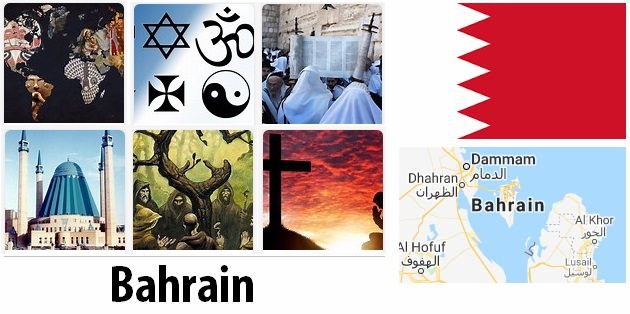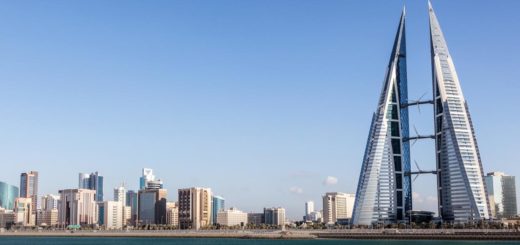Bahrain Religion
According to the Constitution, freedom of religion prevails. The vast majority of residents are Muslims. Bahrain is one of the few countries in the world that has more Shia Muslims (about 60-70 percent of Muslims) than professors of Islam’s dominant direction Sunni.
The ruling family of Al Khalifa and the leading strata of society are Sunni Muslims and many Shia Muslims feel discriminated against by the rulers. Shi’ite Muslim groups have demanded increased political influence. Demonstrations, as well as strikes against opposites, are common (see Modern History and Current Politics). Shi’ite Muslim activists are sentenced to severe punishment, some of whom have even been executed on charges of terrorist offenses.
The country also has Hindus, Christians and some Jews.
2017
December
Death sentence against Shia Muslims for murder plan
December 25
Six Shiite men are sentenced to death for planning to murder the country’s defense chief, Field Marshal Khalifa bin Ahmed Al Khalifa. Seven others are sentenced to seven years in prison while five are released. Of the convicted, eight are on the loose. It has not been previously known that murder plans against Al Khalifa have been revealed. A few days later, ten Shi’a Muslims are sentenced to life imprisonment for belonging to “terrorist groups” and producing explosives.
- Countryaah: Population statistics for 2020 and next 30 years in Bahrain, covering demographics, population graphs, and official data for growth rates, population density, and death rates.
Bahrain on EU tax haven list
December 5
When the EU publishes its first “black list” of tax havens, Bahrain is one of 17 designated countries and territories.
November
Iran is accused of sabotage against oil pipeline
November 10
An explosion causes damage to an oil pipeline outside Manama, owned by state-owned Saudi oil company Aramco. Authorities say accuses Iran of being behind the explosion and claims it is a terrorist act.
Wifaq leader is accused of spying for Qatar
November 1st
Imprisoned Shiite Muslim leader Ali Salman is charged with spying on Qatar’s behalf, in accordance with previous charges (see April and August 2017). In November 2018, he is sentenced to life imprisonment.
October
Long prison sentence for Iranian cooperation
October 31st
Long prison sentences are announced for a total of 29 people for two days, and all but four of the convicted are also deprived of their citizenship. First, prosecutors state that 19 people were sentenced to between ten years and life in prison, accused of cooperating with Iran and of plans to overthrow the government. The convicted are to belong to al-Wafa’s Islamic movement, a banned group accused of supporting Iran.
Activists’ relatives get imprisoned
October 30th
Three relatives of human rights activist Sayed Ahmed Alwadaei are sentenced to three years in prison, accused of posting a “false explosion charge” for the purpose of spreading terror. Alwadaei states that his brother-in-law, mother-in-law and cousin were forced to confess during torture. The judgments are set by the Supreme Court on February 25, 2019. Organizations such as Human Rights Watch and Amnesty International believe that the purpose of the judicial process is to pressure Alwadaei, who has been deprived of his citizenship and lives in exile in the UK.
Iran is accused of hosting terrorists
October 18
Interior Minister Rashed Al Khalifa accuses Iran of providing refuge to 160 Bahrainis convicted of terrorism and deprived of their citizenship. He accuses the Iranian Revolutionary Guard of having trained the group, which was convicted of attacks that led to 25 dead and over 3,000 injured.
September
“Increased oppression of oppositionists”
The human rights organization Amnesty International is accusing the Bahrain authorities that, contrary to its promises of reform, it has “dramatically increased” the oppression of political opponents in the past year. A steep rise in the number of arrests has been noted since June 2016, says Amnesty. Since demonstrators took to the streets in 2011 to demand a democratic governance, hundreds of activists have been imprisoned and some of them have been deprived of their citizenship, the AFP news agency writes.
August
Qatar is accused of trying to overthrow the government
August 16th
In state media, Qatar is accused of being behind the government protests that have been going on in Bahrain since 2011. According to a report, then-Qatari emir Hamad has directly asked Wifaq leader Ali Salman to encourage protesters to go out into the streets and pressure the government. A legal investigation into a series of telephone calls between the two should have begun.
July
Human rights activist is sentenced to prison
July 10
Nabil Rajab, president of the Bahrain Human Rights Center, is sentenced to two years in prison for “spreading fake news” (see also December 2016). According to the judgment, Rajab has undermined Bahrain’s “prestige”. Rajab is being dropped for statements he made in interviews with TV journalists in 2015.
June
Long sentences for 26 Shia Muslims
June 15
A court sentenced 26 Shia Muslims to attempted murder of a police officer and to formed a “terrorist group” between 2011 and 2013. Twenty of them are sentenced to life imprisonment while six are sentenced to 15 years in prison.
The Pearl Square is reopened under a new name
June 14
The large roundabout that was the center of the 2011 protests reopened after being closed for a long time, but is now no longer called Pärltorget but only the Farouk junction. The monument that was previously on the site has been demolished.
Qatar sympathies are forbidden
June 14
A Bahraini is arrested for expressing sympathy for Qatar in social media. The authorities have warned that such expressions may constitute a criminal act.
Relations with Qatar are broken
June 5
Bahrain, as the big brother of Saudi Arabia and the United Arab Emirates, Egypt and Yemen, breaks off diplomatic relations with Qatar. Qatar is accused of supporting IS and al-Qaeda and in the background there is Saudi dissatisfaction with Qatar’s support for the Muslim Brotherhood, al-Jazira and Iran. All land relations with Qatar are closed, Qatari plan is banned in neighboring countries’ airspace, Qatari citizens are ordered out and neighboring citizens are ordered to leave Qatar.
May
al-Waad is banned
30 May
A court orders that al-Waad be dissolved and accuse the secular opposition group of advocating violence, supporting terrorism and encouraging crime. According to the court, Waad has called the three Shi’a Muslims executed in January “martyrs”, expressed solidarity with the Shi’ite Wifaq banned in July 2016, and called the 2002 constitution illegitimate. Amnesty International calls the allegations baseless and absurd, and warns that Bahrain is about to completely violate human rights.
Violent assault against Qasim’s home
May 23
Five people die when police open fire on Qasiman supporters in connection with a strike against the Shiite leader’s residence, two days after the verdict against him. Nearly 300 are arrested on strike. Isa Qasim himself is not arrested.
Jail against Isa Qasim
May 21
After almost ten months of trial (see July 2016), Shi leader Isa Qasim is sentenced to one year in prison on condition of illegally collecting money and money laundering. Two employees receive the same penalty and all three are also sentenced to pay the equivalent of SEK 2.3 million in fines. Qasim is in his residence outside Manama, where supporters have been watching since he was deprived of his citizenship in June 2016.
April
36 are convicted as terrorists
April 25
A court sentenced 36 Shi’a Muslims accused of belonging to a “terrorist group” with intent to attack the police, depriving them of their citizenship. Three people are sentenced to life and the others are sentenced to between three and ten years in prison. Amnesty International accuses the state of “dramatically” stepping up measures against anyone perceived as a government critic.
Rajab acutely ill
April 8
Human rights activist Nabil Rajab is rushed to hospital from the detention center. A few days earlier he had surgery for bleeding tumors on his back. Two trials have been initiated against Rajab but they have been repeatedly postponed (see June 2016).
Military trials against civilians are introduced
April 3
The King approves a constitutional amendment which means that civilians can be brought before a military court. The legislative amendment drafted by Parliament has faced harsh criticism from human rights organizations.
The Wifaq leader’s judgment is shortened
April 3
Ali Salman’s imprisonment is reduced to four years, the same sentence he received in June 2015. An appeal court in May 2016 increased the sentence to nine years, which was set in December of that year. The punishment was due to the fact that previous acquittal of allegations of attempting the largest government was rejected. Now the Court of Cassation, the country’s highest legal body, determines the original penalty without giving any details.
January
Three are executed for police murder
January 15
Three Shi’a Muslims convicted of murdering three police officers in 2014 are executed. Human rights organizations have expressed concern that they admitted the murders after torture and were sentenced after a failed trial. It is the first time in six years that a death penalty is being enforced in Bahrain.
Terrorist convicted are released from prison
January 1st
Between four and six armed men enter a prison south of Manama and release ten people convicted of terrorist offenses. One police officer is killed and one injured in connection with the exemption.




